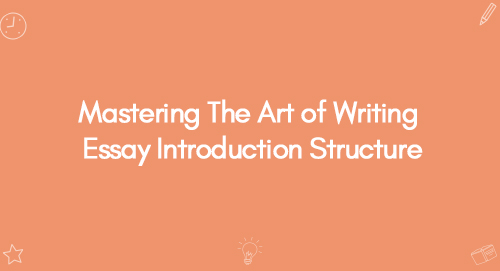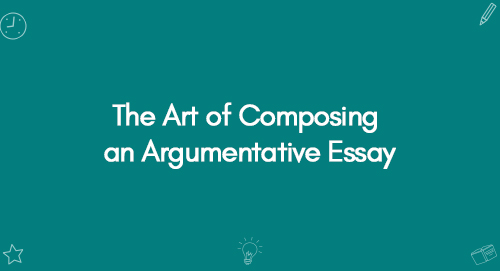The Art of Composing an Argumentative Essay | Example and Element
The Art of Composing an Argumentative Essay | Example and Element

Mastering the Harvard Essay Format: A Comprehensive Guide
December 20, 2023
Philosophy Essay Examples | Purpose and Mistakes to Avoid in Writing
January 16, 2024An argumentative essay is a form of writing that allows the writer to adopt an empirical approach and defend their staunch position through a strong thesis statement. An argumentative essay is more than rigidly supporting one’s point of view. The writer must explore and research every aspect of the topic and refute the counterarguments through evidence and reasoning.
Learn How to Structure an Argumentative Essay
A strong outline for an argumentative essay should include the effective placement of the arguments and rebuttals to the counterclaims. It is always easier to start with a less complex argument and move towards the most complex one. This way, it would be easier for the reader to follow the arguments through the transitions.
How Does a Convincing Argumentative Essay Address Counterclaims?
There are instances where it is just too complex to refute a counterclaim altogether. In order to maintain the accuracy of the argument, the writer must find common ground with the opposing side, as the counterclaims are just too strong, and a vast grey area needs to be addressed. The placement of the arguments and rebuttals of the counterarguments is crucial. The different formats of argumentative essays alter the positioning of those claims, which then changes the entire essay layout.
Argumentative Essay Example
Is the Death Penalty Effective in Lowering the Crime Rate? Yes or No?
In the US, there has long been disagreement over the death penalty. While the death penalty is legal in 24 states, the remaining 26 have either outlawed it or enforced deferment that prevents it from being used. The death penalty's advocates contend
that it effectively discourages criminal behaviour. However, repeatedly, it has been established that this argument is inaccurate and that the death penalty does not hinder crime. Furthermore, the death penalty is final and irrevocable, leaving no possibility for error in our faulty legal system. Lastly, there is evidence that the death penalty is used in a racially discriminatory manner; Black Americans make up only 13% of America's population, and nearly 41% of death row inmates are Black. The death penalty ought to be abolished nationwide in the US for all of the reasons mentioned above.
The death penalty's supporters have long maintained that the punishment works as a powerful deterrent to crime. They claim that although it may not be attractive, its deterrent qualities stop crimes, and Its continued usage is warranted. The evidence does not support this notion. There is no proof that other forms of punishment, such as lengthy prison terms, are less effective at deterring crime than the death penalty. States that retain the death sentence do not see lower rates of crime than those that have banned it altogether. Similarly, states that have abolished the death penalty have not seen a spike in homicide or crime rates.
For instance, the murder rate in Louisiana, a state where the death penalty is permissible, is 21.3 per 100,000 people. The murder rate in Iowa, where the capital sentence was repealed in 1965, is 3.2 per 100,000 people. The murder rate is 9.6 in Kentucky, where the death penalty is legalised and 8.7 in Michigan, where it is not. Murder rates are simply unaffected by the death penalty. If it did, states that continue the practice would have noticeably lower murder rates. Hence, it is proven that the death penalty does not deter crime. As a result, it ought to be declared illegal.
It may be comforting to believe that the death penalty is applied without prejudice, that putting murderers to death deters more murders, and that our judicial system is perfect and has never executed the wrong person. However, as we have shown, all those ideas are reassuring inaccuracies. The death penalty does not affect preventing future crimes; if it did, jurisdictions that have abolished the death penalty would have greater crime rates. Since the death penalty is an irreversible punishment administered by a flawed legal system, erroneous executions are inevitable. People of race are additionally adversely impacted by the death penalty. In both practical and moral terms, the death sentence is a repugnant practice. As a result, the US should ban the death penalty across the board and follow the lead of more than 85 other countries worldwide.

Important Elements for Composing an Argumentative Essay
A few elements are imperative to consider before the writer starts writing the essay.
- The writer must choose a topic they are passionate about, which must be debatable.
- Both sides of the topic must be extensively researched.
- The writer must prepare a detailed outline of the essay and decide the positioning of the arguments.
- The language of the essay must be conflicting but respectful.
Conclusion
Composing a well-balanced argumentative essay requires both time and effort to an optimal level. The writer must present evidence-based arguments and rebuttals against possible counterclaims. A well-written argumentative essay should end on a strong concluding note, and the conclusion must reflect the arguments made throughout the essay.
Free Premier Essay Writing Topics
Essay Writing is an essential part of academics which presents the ideas, arguments, opinions, or positions of the writer regarding the topic. The writer supports his claims using facts, evidence, or survey studies.
- Clear presentation or understanding of the type of essay
- An appealing introduction with an unambiguous thesis statement
- A well-defined structure of body paragraphs supporting the thesis
A prospective conclusion with an optimistic tone



















